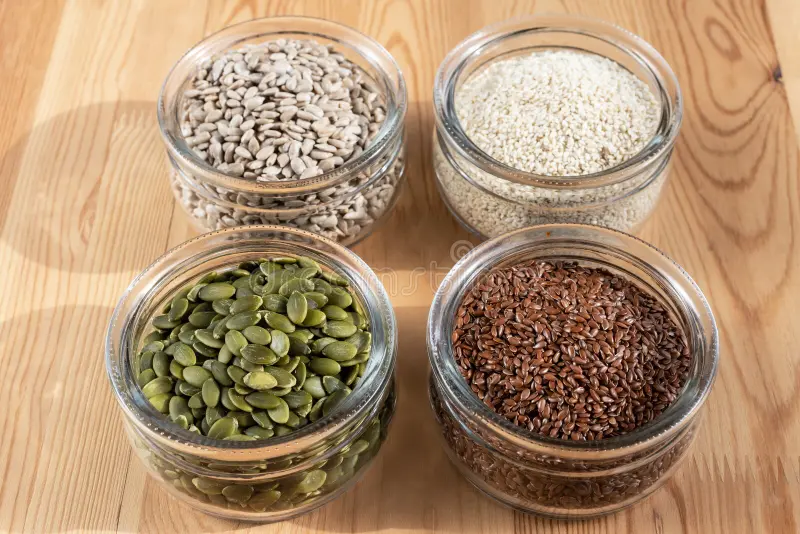Discover the natural approach of seed cycling for hormonal balance. Learn how flax, pumpkin, sesame, and sunflower seeds can regulate estrogen, progesterone level, ease PMS ,improve menstrual health and promote fertility.
What is Seed Cycling?
Seed cycling is a gentle food based therapy that involves eating specific seeds during two key phases of the menstrual cycle to support hormone production, detoxification, and balance. Popular in holistic and functional medicine, seed cycling is gaining attention as a natural way to support hormonal health, reduce PMS symptoms, regulate cycles, and even improve fertility. It is commonly used for:
PCOS (Polycystic Ovary Syndrome)
Irregular or absent periods
PMS (mood swings, bloating, cramps)
Perimenopause & menopause symptoms
Fertility support & ovulation regulation
How Does Seed Cycling Work?
Seed cycling involves rotating four types of seeds:flax, pumpkin, sesame, and sunflower ,based on the two main phases of the menstrual cycle
The menstrual cycle has two key phases, each requiring different hormonal support:
Follicular Phase (Days 1–14): Flax & Pumpkin Seeds
Goal: Boost estrogen levels naturally.
Seeds:
1 tablespoon of ground flax seeds.
1 tablespoon of ground pumpkin seeds.
These seeds are rich in phytoestrogens (plant-based estrogens), omega-3 fatty acids, and zinc, which support healthy estrogen production and metabolism.
Luteal Phase (Days 15–28): Sesame & Sunflower Seeds
Goal: Support progesterone production.
Seeds:
1 tablespoon of ground sesame seeds
1 tablespoon of ground sunflower seeds
These are high in selenium, vitamin E, and omega-6 fatty acids, nutrients that help balance progesterone and reduce inflammation.

By eating specific seeds in each phase, seed cycling helps:
Detoxify excess hormones
Support liver function (crucial for hormone metabolism)
Balance estrogen & progesterone naturally
For Irregular or Absent Periods:
Follow the moon cycle (new moon = Day 1, full moon = Day 15).
Or track ovulation (start luteal seeds after ovulation is confirmed).
For Menopause/Post-Menopausal Women:
Alternate seeds every two weeks (since there’s no menstrual cycle).
Health Benefits of Seed Cycling
Though scientific research is still emerging, many women report significant improvements in hormonal health. Some of the reported benefits include:
Regulates Menstrual Cycles
Helps reduce irregularities and support consistent ovulation patterns.
Eases PMS Symptoms
Reduces bloating, cramps, breast tenderness, and mood swings.
Supports Fertility
Encourages a healthy balance of estrogen and progesterone ,both vital for conception.
Balances Hormones Post-Birth Control
Can assist in resetting natural hormonal rhythms after stopping hormonal contraceptives.
Helps in Menopause and Perimenopause
Seed cycling may ease hot flashes, mood changes, and sleep disturbances.
Seed Cycling and Hormonal Disorders
Seed cycling may be especially beneficial for women struggling with:
PCOS (Polycystic Ovary Syndrome): Supports estrogen detoxification and ovulation.
Endometriosis: May help balance excess estrogen.
Thyroid Issues: Nutrients like selenium and zinc are supportive of thyroid health.
Adrenal Fatigue: Provides essential fatty acids and minerals that reduce stress on the endocrine system.
How to Start Seed Cycling
Step-by-Step Guide
Track Your Cycle: Identify the first day of your period as Day 1.
Grind the Seeds: Whole seeds can pass through undigested ,grinding them improves absorption.
Take 1 Tbsp Each Daily: Combine the two seeds for each phase in smoothies, oatmeal, salads, or yogurt.
Stay Consistent: Like any natural approach, it may take 2–3 cycles to notice changes.
Optional Additions
Evening Primrose Oil: During the follicular phase for extra omega-3s.
Vitex (Chasteberry): During the luteal phase to support progesterone .
Does Seed Cycling Really Work?
While more clinical studies are needed, anecdotal evidence and nutritional science support seed cycling because:
Seeds provide essential fatty acids (omega-3 & omega-6) needed for hormone synthesis.
They contain minerals (zinc, selenium, magnesium) critical for ovulation and progesterone.
Lignans help prevent estrogen dominance, a common issue in PCOS and perimenopause.
Avoid
Roasted & salted seeds (high heat destroys nutrients).
Pre-ground flaxseeds (oxidize quickly—grind fresh).
The Science Behind Seed Cycling
Flaxseeds & Pumpkin Seeds
Flaxseeds: High in lignans, which help moderate estrogen levels by binding to excess estrogen and removing it.
Pumpkin Seeds:Rich in zinc, which supports in estrogen metabolism and also progesterone production later in the luteal phase.
Sesame Seeds & Sunflower Seeds
Sesame Seeds: High in lignans and selenium, which help detoxify excess estrogen and support thyroid function.
Sunflower Seeds:Packed with vitamin E and selenium, which boost progesterone and reduce inflammation.
Who Should Try Seed Cycling?
Women with PCOS, irregular periods, or amenorrhea.
Those struggling with PMS, heavy bleeding, or painful cramps.
Women in perimenopause or menopause experiencing hot flashes & mood swings.
Anyone who is looking for a natural way to support fertility.
Who Should Avoid It?
People with seed allergies.
Those on blood-thinning meds (flaxseeds have mild blood-thinning effects).
Additional Tips for Hormonal Balance
Eat a hormone-friendly diet (cruciferous veggies, healthy fats, lean protein).
Reduce stress (high cortisol disrupts progesterone).
Support liver detox (dandelion tea, milk thistle, lemon water).
Exercise moderately (excessive workouts can worsen hormonal imbalance).
Are There Any Side Effects?
Seed cycling is generally safe for most people having no any side effects . However, those with seed allergies, digestive sensitivities, or autoimmune conditions should consult with a healthcare provider before starting. Also, hormonal conditions should be evaluated by a qualified practitioner to ensure this method complements other treatments.
More clinical studies are needed to validate seed cycling as a protocol, but anecdotal evidence and traditional use make it a low risk option for many.
Final Thoughts: Should You Try Seed Cycling?
Seed cycling is a simple, affordable, and holistic way to support hormonal balance. While it may not be a magic fix, it can be an effective addition to a broader lifestyle approach that includes nutrition, stress reduction, sleep, and exercise.
If you’re looking for a natural way to support your cycle, improve PMS, or optimize fertility, seed cycling could be a great start with minimal downside and potential benefits.